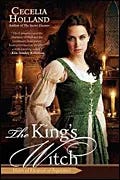The King's Witch revolves around the fictional Edythe, informally adopted by Eleanor of Aquitaine after a massacre of Jews in France. As the novel opens, she is on a mission for the queen in Cyprus with Richard the Lionheart during the Crusades. Though she loves and feels indebted to the queen, she resents having to spy for her. "Eleanor never asked anyone's leave. 'I trust you, Edythe - watch over my children. And keep me informed. You can use the Jews for that; they have connections everywhere.'" The instruction about the Jews stirs up anxious grief Edythe would rather keep buried.
Though she learned some medicine from her father, Edythe knows her limits. When Richard falls ill and she struggles to save his life, they form a tenuous bond, learning each others' secrets without developing the trust that makes it comfortable. Richard's obsession with regaining Jerusalem arises from the fear that his attraction to men makes him a monster. Edythe is a monster of another sort, an unbaptized Jewish convert to Christianity. "If I take Jerusalem," he tells her, "we're all saved, you with me."
When she begins falling in love with Richard's illegitimate half-brother, Edythe has more to lose if Richard reveals her secret. Meanwhile, her search for medical knowledge leads her to consult Jews, and she begins to yearn for her lost heritage. Her two growing desires seem hopelessly opposed.
The power in Holland's writing comes from how convincingly she portrays people of the past, who likely suppressed emotions their society frowned on, as many people still do. Readers who like to be swept off their feet by a character's passions may not engage with this emotionally restrained novel, but it’s an important addition to the many novels about Richard the Lionheart and the Third Crusade. The King's Witch offers an illuminating portrait of a man so focused on earning redemption that he neglects his earthly kingdom. (2011; 313 pages, including an Afterword separating fact from fiction, and Discussion Questions for book groups)




